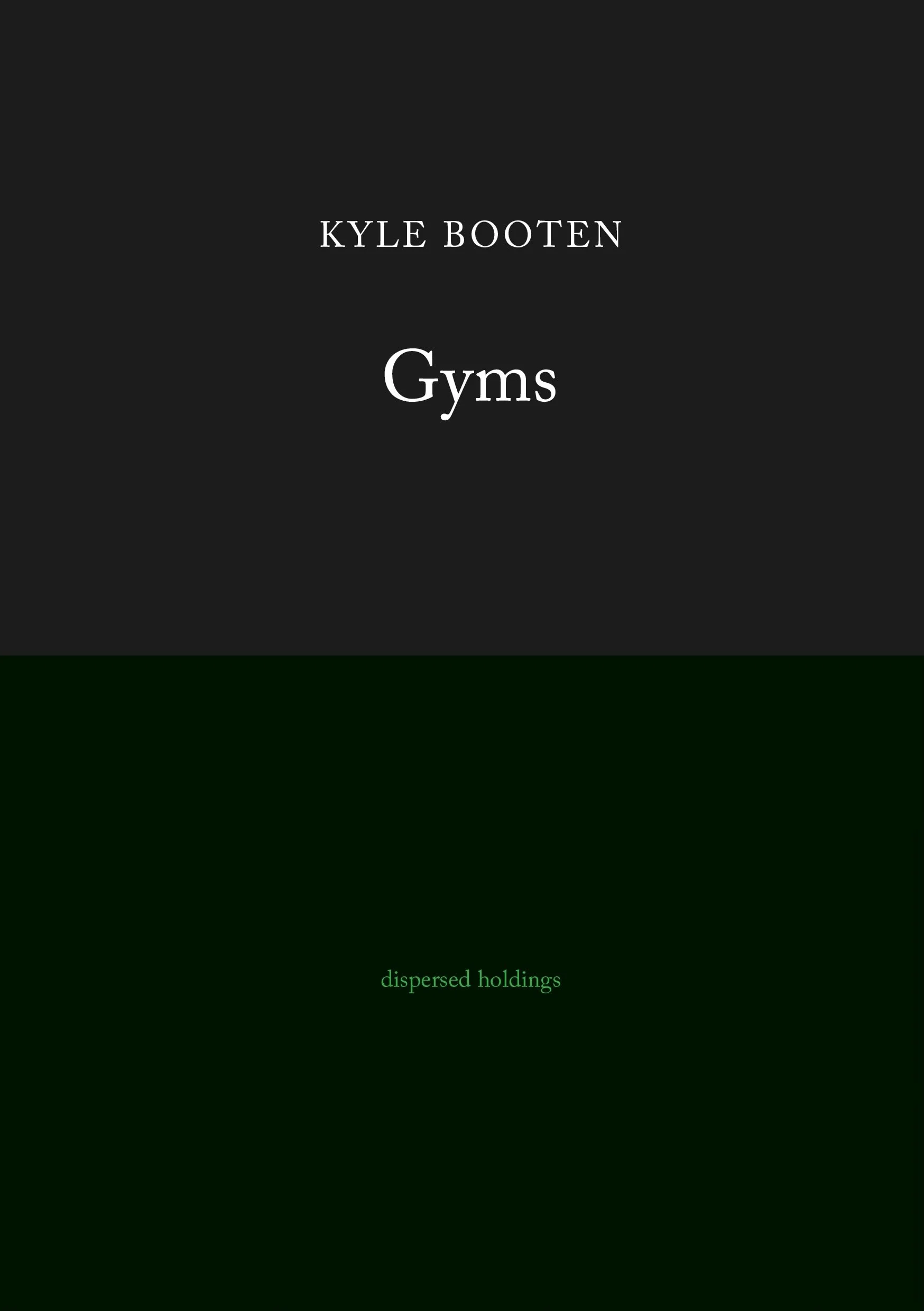Our computational devices—increasingly powerful, increasingly “intelligent”—can now think for us, perceive for us, pay attention for us, write for us. Lest we forget how to do these things ourselves, we dearly need new models for co-existing with algorithmic media, the artificial minds on our desks and in our pockets.
Kyle Booten’s Gyms offers one such model. This book documents Booten’s process of developing nine different “gyms”—computer programs that, as he composes poems, place his human mind under unusual strain, trigger its unused muscles, and test its focus and endurance. One gym goads him to pick up and ponder weighty allusions. Another challenges him to painstakingly perceive and describe the features of various artworks. Still another stretches his verse’s syntax beyond the limits of human cognition. Gyms is a collection of poetry, but it is also the lab notebook of a speculative and idiosyncratic Human-Computer Interaction research, or of an applied, empirical approach to the future of poetic form. It invites the reader to imagine—and, more than imagine, create—their own answers to the question: how can we program ourselves to think the uncomputable?
Early Praise for Gyms
While poets often subject themselves to baroque traditional forms or Oulipian constraints for a peppy, life-affirming challenge, Kyle Booten in Gyms goes a step further: handing his craft over to the whims of our latest dieu trompeur, the tirelessly anti-humanist algorithm, or, as he calls his self-created evil taskmasters, “gyms.” As the giddily serious pataphysical preface, the “Post-Award Report,” notes, these gyms—with titles like “METAPHYSICAL REPS,” “CLARE’S DAFFIES” and “HY_INTENSITY WIKI_FORAGE”—jazzercise the mind toward optimal states of “linguistic flexibility,” waking the poet from noetic lethargy to re-enter the fields of language—now littered with balance beams, barbed wire and logrolling contests—anew. Like Satie’s “Sports et divertissements,” these poems celebrate celerity: agile jaunts through thickets of thought where one meets by turns “featureless vegetal hair” and a “slice of moldy bread nuking off like a Tokay gecko”—and a whole lot more—in a relentless barrage of cybernetic co-creativity. Philip K. Dick, if you’re still out there: we have a problem. —Brian Kim Stefans
Child of de Selby, Tzara, Rorschach and Queneau, Kyle Booten has invented a book that makes the reader crave digital affordances. Pristine, ludic, fine-tuned, speculative, these gyms are also embassies where language and information, ardor and critique, teacherly HAL and self-effacing human parlay for poetry. It’s a different kind of sweat. — Mairéad Byrne
Come over here, lazy reader. This is going to be good for you. You need exercise, and Gyms is a book full of exercises, endlessly inventive and pitilessly rigorous. Better still, or worse: they make for some of the deepest thinking about intelligence artificial and natural you are likely to find anywhere. No joke. This book is definitely not funny. So quit laughing! Get to work! — Jeff Dolven
To be passively written by ChatGPT’s mainstream knowledge, or to be cleverly stimulated by Gyms’ nasty tricks: that is the question raised by Kyle Booten’s little black and green book. Half-way between Marcel Mauss and Kenneth Goldsmith, it devises thrilling Techniques of the Mind, to help us Wasting Time on AI—not on the boring stereotypes of Artificial Intelligence, but on the Artificious Inventivity of a minimally equipped poetry (no Alimony for Invidia in this joint). This type of AI must be free: all you have to pay is attention to the wor(l)d. (Un)Creative writing becomes Ur-Creative, insofar as Tekhnè is the origin of Art. Are these Gyms nasty to your mental laziness (and to platform capitalism)? Most certainly, most poetically! — Yves Citton
For those who worry that “AI” will produce a generation of canned thinkers, writers-on-autopilot, and plastic poems, Kyle Booten’s Gyms is a restorative glimpse of an alternative future. Imagine code that makes poets and others write smarter and harder—a gym rather than a factory for the mind. This is a must-read volume for anyone keen for ludic verse, Wildean wit, wide-open experiment, and techno-éclat for chatbot era. — Lauren M.E. Goodlad
About the Author
Kyle Booten’s writing, which often subjects itself to algorithmic meddling and mediation, has appeared in Fence, Boston Review, Lana Turner, and elsewhere. He is also a co-founder of Ensemble Park: A Journal of Human+Computer Writing, the author of Salon des Fantômes, and an assistant professor at the University of Connecticut.
Excerpts of On Your Feet: A Novel in Translations have been published in The White Review and New Sinews.

